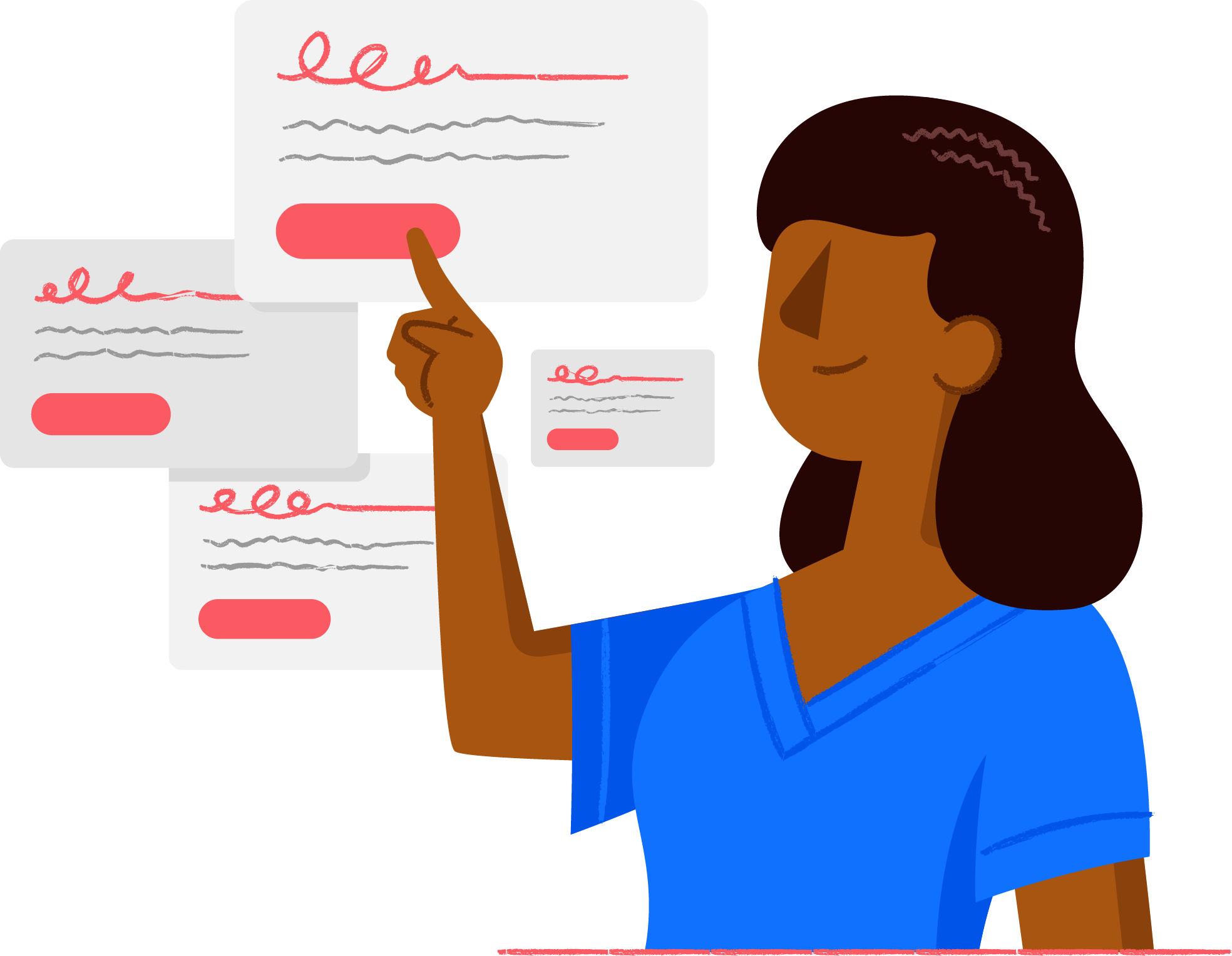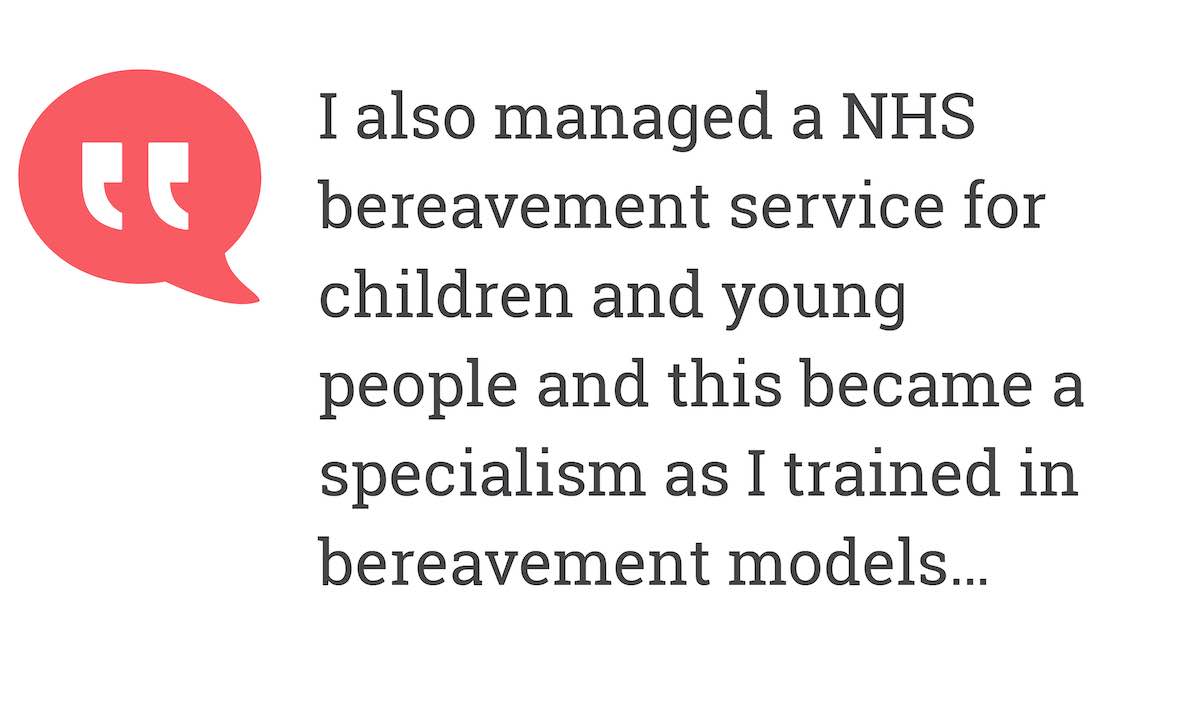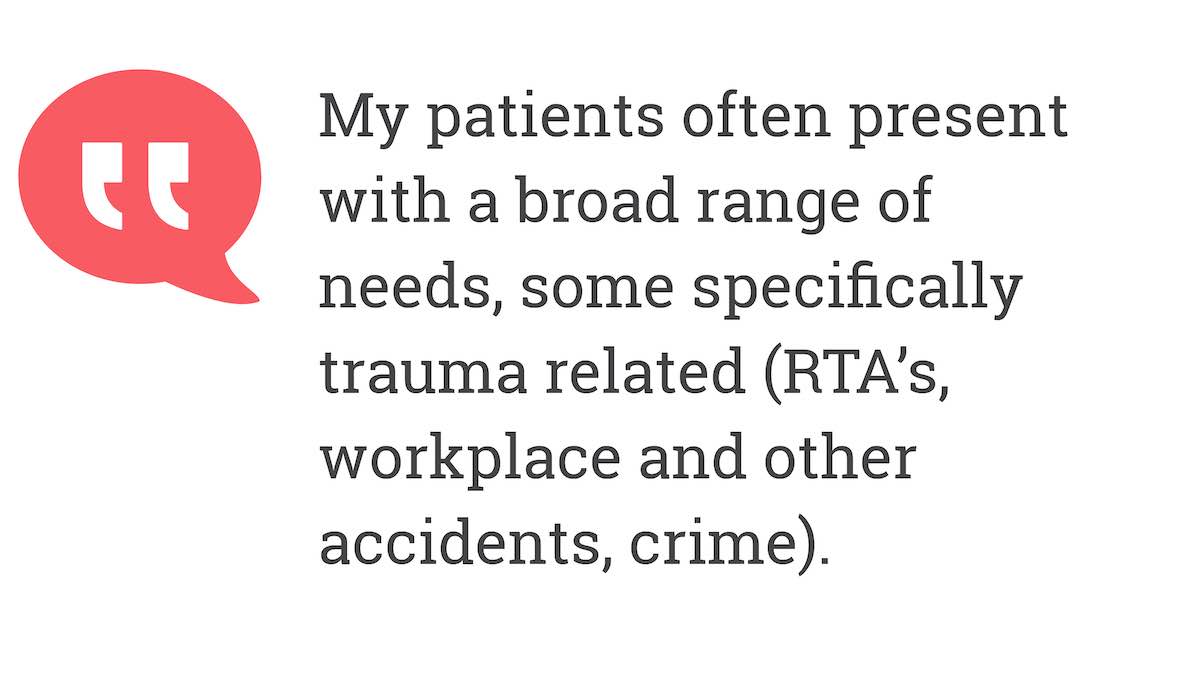- 01 September 2020
- 8 min read
How To Change Your Career And Become Specialist Counsellor
Subscribe "Not every role has a straightforward pathway into employment."
"Not every role has a straightforward pathway into employment."Specialist Counsellor, Angie Hobson, takes a look back at how she swapped a career in banking, for one in Health & Social Care, and how it’s never too late to make a significant change in your life.
Topics covered in this article
How I Began My Career In Health & Social Care
What Are The Salary Expectations?
What To Expect From Your Job As A Specialist Counsellor?
What Are The Challenges Faced By A Specialist Counsellor?
My Specialist Counsellor Interview Advice

Search Jobs
1000s of jobs for Nurses & Care Professionals. No.1 for UK nursing, care & healthcare jobs.
Search JobsHow I Began My Career In Health & Social Care
My name is Angie Hobson and I work as a Specialist Counsellor in Amputee Rehabilitation.
I originally began my working career in Banking and Recruitment.
I worked in many different customer service roles in banking, gaining experience in marketing and finance.
My final role in banking - before my change in career plan - was in recruitment and assessment.
I trained with occupational psychologists to become a recruitment assessor.
I was able to return to college and I trained for 3 years, initially, for a generic counsellor role.
My original Diploma in Counselling gave me the skills to gain experience in a wide variety of roles within Health & Social Care.
I felt that I possessed the skills to enter a caring profession, strong empathy and an ability to work with people on lots of different levels and at different life stages.
My First Post
I worked for many years at a City Centre hostel for homeless men.
This was where I gained experience of how to work within a multi-disciplinary team, working closely with other specialities, e.g. Mental Health Nurses, Community Psychiatric Nurses, Rehab Teams, Occupational Therapists, Physiotherapists, Resettlement Workers and the third sector teams such as Alcoholics Anonymous and Gamblers Anonymous.
It was during my employment at the hostel, that I made a conscious decision to focus my skills within an early intervention role.
I applied for a role as a counsellor for young people aged 14-25 years and I trained with CAMHS professionals over a number of years.
I became Service Lead of a very specialist service which was commissioned to target the emotional needs of young people aged 14-19 years.
The role crossed over periods following young people from secondary school, to sixth form education, eventually leading to university.
Our team supported so many young people who were struggling with difficulties such as lack of confidence, low self-esteem, poor assertiveness skills, bullying, anxiety, self-harm, coping with exam pressure and very difficult childhood family problems.

What Do You Think?
Ask questions, comment and like this article below! Share your thoughts, add your opinion in the comments below.
CommentHow I Became A Counsellor
As Service Lead, I had finance and budget responsibilities as well as team leadership – my previous experience in banking and finance were definitely factors which helped me into this position.
I completed NHS Management and Leadership programmes during this phase of my career.

I also managed a NHS bereavement service for children and young people and this became a specialism as I trained in bereavement models gaining more specific skills focussing on bereavement and loss.
I was funded through a Masters Level 7 programme in Counselling & Psychotherapy which provided me with additional training in Cognitive Behavioural Therapy, Trauma Focused Counselling and Mindfulness Practitioner training.
What Are The Salary Expectations?
When I saw the post of Specialist Counsellor in Amputee Rehabilitation, I was confident that my broad range of skills, training and expertise would enable me to be successful in this new phase of my career.
The NHS pay banding is usually within Agenda for Change Band 5 for Counsellor entry level, through to Band 6-7, Service Lead, Counsellor Specialist level. (See current NHS Agenda for Change salary scales).
There are a number of Specialist Counsellor roles within the NHS, e.g. Genetics Counsellors, Bereavement Counsellors, Counsellors in Neuro Rehabilitation.
These positions tend to be located mainly within specialist units or specialist services both in the NHS and private sectors.
I had experience of working with patients/clients/residents with limb difference in other roles and also of working within wider MDT’s.
So when I saw my current post advertised, I was confident that my skills and training were broad enough to fulfil this very specialist role with amputee rehabilitation.

Become A Community Contributor
Share your story to help and inspire others. Write or create a video about your job or your opinions!
ContributeWhat To Expect From Your Job As A Specialist Counsellor?
My job is varied and challenging.
I work with third sector charities which support their members with limb difference, the causes may be genetic, through to amputation(s) in later life.
My patients range from young children and I tend to support their parents/carers too, right through to elderly patients who feel able enough to go through prosthetic rehabilitation programmes.
I support patients at their pre-op consultations (pre-amputation surgery) and I support couples at pre-natal consultations where limb difference has been identified at a 20 week scan.

My patients often present with a broad range of needs, some specifically trauma related (RTA’s, workplace and other accidents, crime).
I support patients to come to terms with their loss, with adjustment disorder and emotional regulation.
I have never regretted my original decision to retrain from my career banking and I do feel there have been many opportunities to apply my transferrable skills, e.g. team working, adaptability, information gathering and processing, front-line customer service skills not forgetting great communication.
What Are The Challenges Faced By A Specialist Counsellor?
I have never lost my enthusiasm for my role, I work well under pressure, I am open to new challenges, which can include frequent changes in working practices – this has been most important during these COVID times.
I have had to work out different ways of offering support and taking time to be reflective about what has been most helpful, not only to my patients but also to the wider team which I feel privileged to be part of.
I work in a job where I deal with frequent high expressed emotion, fear, anger, disappointment, rejection and high levels of depression and anxiety.
I prioritise my own mental health needs.
I work hard to personally practice the techniques and strategies which I share with my patient group.
I feel I am resilient, calm under pressure and I work hard to listen to my patients’ needs, without comparing one situation to another – everyone is an individual and deserve to be treated as such.
I would recommend that anyone looking for a significant change in career path really research their career prospects following their studies.
Not every role has a straightforward pathway into employment.
Therefore it is important to choose training opportunities very carefully and do your research before committing to training courses.
You can spend a lot of money only to find yourself struggling to gain paid employment at the end.
My Specialist Counsellor Interview Advice
There is an agenda within the NHS at present, which is referred to as IAPT, which stands for Improving Access to Psychological Therapies.
If you are interested in this type of a career then, again, research IAPT training programmes and potential job opportunities.
We are living in a fast paced environment at present, the NHS is changing too to keep up with a surge in technologies, but this is creating the potential for lots of different job opportunities across both the public and private sectors.
My experience within the NHS both as a recruiting manager and an applicant, is that generally speaking the interviewer want you to do well, they aren’t looking to trip you up and I’ve never come across any trick questions.
Research the role, read the job description and person specification very carefully and make sure that you can evidence that you meet the essential criteria on your applications as a minimum standard, try your best to cover the desirable criteria section too where possible.
Don’t try to ‘wing it’ you’ll definitely come ‘unstuck’ when you face the technical questions.
Let me know in the comments your thoughts on becoming a Specialist Counsellor and what I've said about my journey - let's chat there!
Oh, and please Like this article to let me know you enjoyed it - thank you!






About this contributor
Specialist Counsellor in Amputee Rehabilitation
My name is Angie Hobson and I work as a Specialist Counsellor in Amputee Rehabilitation. I originally began my working career in Banking and Recruitment. I worked in many different customer service roles in banking, gaining experience in marketing and finance. I was able to return to college and I trained for 3 years, initially, for a generic counsellor role. My original Diploma in Counselling gave me the skills to gain experience in a wide variety of roles within Health & Social Care.
More by this contributorWant to get involved in the discussion?
Log In Subscribe to comment